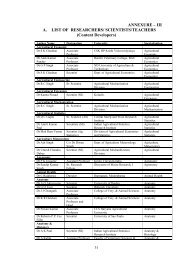Agricultural Resources Information System (AgRIS): An e ...
Agricultural Resources Information System (AgRIS): An e ...
Agricultural Resources Information System (AgRIS): An e ...
Create successful ePaper yourself
Turn your PDF publications into a flip-book with our unique Google optimized e-Paper software.
• Access to, and information about, income-earning<br />
opportunities.<br />
9.5 The potential impact of ICTs on poverty reduction can be<br />
seen at the micro, intermediate and macro levels. At the<br />
intermediate level, ICTs can help a range of intermediary<br />
institutions and agents work more effectively and be more<br />
responsive to the needs of the poor:<br />
• Health workers can access the latest information; get<br />
assistance with diagnosis, and more effectively target<br />
interventions and resources with the help of ICTs.<br />
• <strong>Agricultural</strong> extension agents can more effectively access and<br />
share local and global knowledge on crops, pest management,<br />
irrigation and other aspects of small-scale agriculture relevant<br />
to the needs of the poorest.<br />
• Teachers can access and share new training materials, continue<br />
their own training, and expose their students to the ideas and<br />
experiences of children elsewhere.<br />
• Local government officials can get better information about the<br />
needs of the poor, communicate those needs more effectively<br />
to other levels of government, and be held more accountable by<br />
the local people they serve.<br />
• ICTs can help local businesses be more productive, and more<br />
responsive to their customers.<br />
Improving information flows and communication services is a<br />
necessary but not sufficient condition to eliminate poverty. One<br />
of the major problems of using ICT for poor is language barrier.<br />
46




